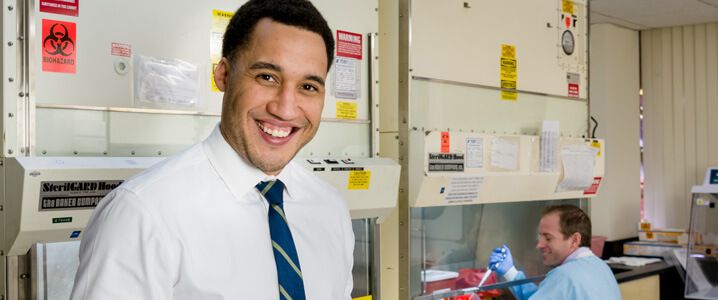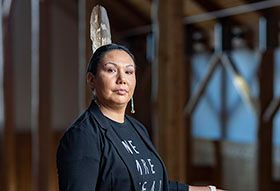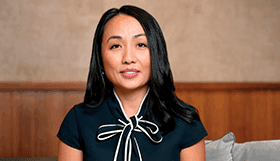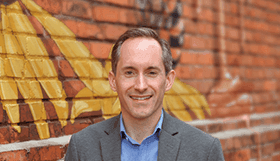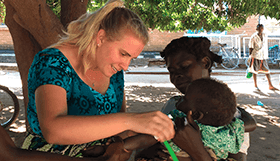UW Majors: Genetics and Bacteriology
Age: 36 | Los Angeles
Assistant Clinical Professor of Pathology and Laboratory Medicine: UCLA School of Medicine • Associate Director of Clinical Microbiology: UCLA Health System • Co-founder and Board chair: Social Justice Learning Institute
As a scientist, Omai Garner specializes in medical microbiology, but what he’d really like to see go viral is academic success.
Even during his undergraduate days as a Chancellor’s Scholar, Garner was passionate about helping underrepresented students reach their educational goals. Today he is a co-founder and board chair of the Social Justice Learning Institute, a nonprofit in Inglewood, California, that aims to empower young men of color to improve their lives by improving their communities.
That mission takes shape through activities ranging from Urban Scholars programs for black and Latino teen boys to a fellowship that exposes high-schoolers to allied health and medical fields, to the 100 Seeds of Change program that is building one hundred home, school, and community gardens in the Los Angeles area. Since it was founded in 2008, the institute has had a real impact: 95 percent of the students who participate in an Urban Scholars program graduate from high school, and 85 percent go on to college.
SJLI’s programs reach around two thousand young men from Los Angeles to Sacramento, California, and Garner and co-founder D’Artagnan Scorza hope to eventually take the program nationwide. “It’s really been expanding at a dramatic rate,” Garner says.
For Garner, it’s always been important to balance his work as a scientist with his commitment to community service.
“I wouldn’t be a scientist, I wouldn’t have the passion I have for outreach, if it weren’t for UW-Madison,” he says.
Chief among his mentors on campus were Mercile Lee, the former assistant vice chancellor and director of the Chancellor’s Scholars program, and the late Paul Bertics PhD’84, a professor of biomolecular chemistry. Garner, who was also a McNair Scholar, worked in the Bertics lab for four years. “He fostered in me a love for scientific research and a passion for laboratory science that I pass on to my students to this day,” Garner says. “Dr. Bertics also encouraged me to pursue a PhD and even suggested that I move to the West Coast. He is truly responsible for my early career progression.”
Garner took the advice, earning his doctorate from the University of California at San Diego and his board certification in medical microbiology at UCLA. Now an associate director of clinical microbiology for UCLA’s hospital, Garner is in charge of infectious-disease testing and helps manage a team of seventy lab scientists who process more than one million laboratory tests a year. And his passion for service extends to his research, as he collaborates with biomedical engineering colleagues to develop a novel diagnostic test for influenza. The goal of the National Science Foundation-funded project is to create a handheld device that could
be used with a cell phone in developing countries where laboratories are scarce.
Garner also stays connected with fellow UW alumni in California and is co-chair of the recently formed Chancellor’s and Powers-Knapp Scholars alumni community in Los Angeles.
“He epitomizes the Wisconsin Idea and the Badger spirit in both his professional and volunteer life,” says Lee. “His high energy, creativity, and drive are incredible, and one wonders how he accomplishes so much.”
